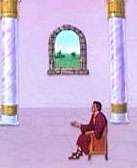Flannelgraph

Flannelgraph (also called flannel board or flannelgram) is a storytelling system that uses a board covered with flannel fabric, usually resting on an easel. It is very similar to Fuzzy Felt, although its primary use is as a storytelling medium, rather than as a toy.
Description of use
The flannel board is usually painted to depict a background scene appropriate to the story being told. Paper cutouts of characters and objects in the story are then placed on the board, and moved around, as the story unfolds. These cutouts are backed, either with flannel, or with some other substance that adheres lightly to the flannel background, such as coarse sandpaper.[1]
Plain, undecorated flannel boards can also be used as a visual aid during presentations, allowing the speaker to display and remove charts and graphs as needed.[1]
Associations with Christianity
Flannelgraph has been (and continues to be) a popular medium for telling Bible stories to young Sunday School students in Christian (and particularly Evangelical) churches.[2] Indeed, it is used as a storytelling method almost exclusively in elementary-level Christian education.[3] This may be attributed, in part, to the fact that flannelgraph is relatively inexpensive, yet provides a more vivid alternative to storytelling without visual illustration.[4]
See also
Notes
- 1 2 Reader's Digest (1972). Write Better, Speak Better (6th ed.). ISBN 0-89577-006-7.
- ↑ Gail Leopold. "Using Flannel Boards in Early Childhood Education". ece-earlychildhoodeducation.com. Retrieved April 20, 2012.
- ↑ Randall Herbert Balmer. Encyclopedia of Evangelicalism. 1st ed. Louisville, KY: Westminster John Knox Press; 2002 [cited 25 October 2011]. ISBN 978-0-664-22409-7. p. 221.
- ↑ "How to Use Flannel Boards". studydiscussions.com. August 31, 2011. Retrieved April 20, 2012.
Books
Marsha Elyn Wright (2000). Creative storytelling with flannelboards. Patty McCloskey (illust.). Torrance, CA: Judy/Instructo. ISBN 978-0-7682-0484-1.